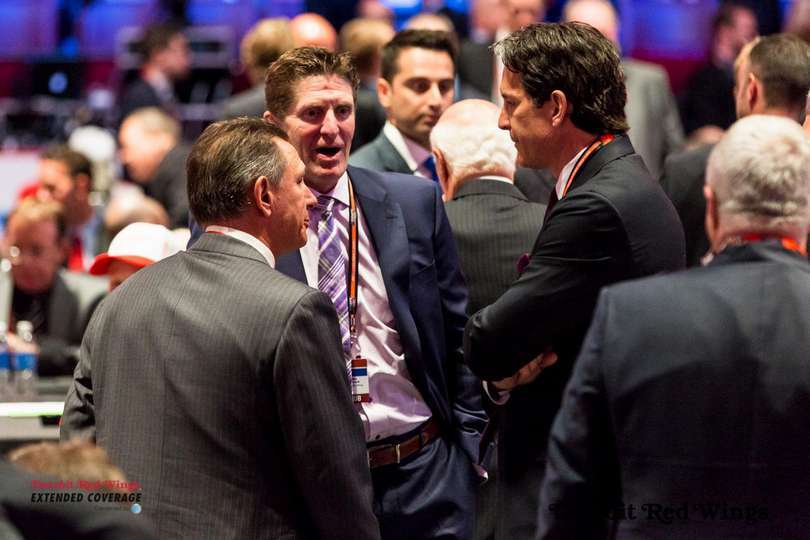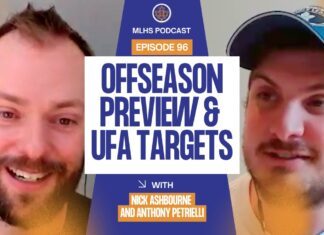Brendan Shanahan joined Prime Time Sports on Tuesday evening, discussing the decision to promote Kyle Dubas to GM, losing Lou Lamoriello and Mark Hunter, lessons to be learned from the Vegas Golden Knights’ run to the Stanley Cup Final, and much more.
When you made the decision to elevate Kyle Dubas to the role of GM, you had to at least think there was a chance that the dominoes would fall the way they have. In other words, Lou Lamoriello might leave, might get another job. Mark Hunter might not be too happy because he was the bridesmaid and not the bride, and might decide to either go back to London or try his hand somewhere else. These are all things you had to take into consideration, didn’t you, when you made this move?
Shanahan: In some respects, I was in a lucky position that I had three really qualified individuals for the job. Quite honestly, the consideration part — as we were winding down the season, Lou’s contract as GM was coming to an end. Whether it was Lou, Kyle, or Mark, I understood that there was a likely scenario that, whichever one I chose, I could possibly and quite likely lose the other two because other teams would want them or they would want to move on. I really focused my efforts on not necessarily who we were going to lose but on who we were going to gain.
I think in the game of hockey, if you sit still and you’re idle, you’re going to be passed by. Who was it that we had that I felt confident was going to take us to the next level and be around for a while, and had a great understanding of the organization? I was lucky to have different options, but in the end, I really felt Kyle best met those needs.
It doesn’t make it easy to have those conversations with Lou Lamoriello or Mark Hunter. You were not caught by surprise, but it was a likely scenario that I understood before I made the decision.
A year ago, you had to make a decision about Kyle as well because Colorado came trying to hire him. At that moment, were you already kind of casting your lot and saying, “This is a guy we can’t lose? This is our future?”
Shanahan: I wouldn’t go as far as to say this was our future. I knew this was a very important option for us, and we had – quite frankly – just redone his contract. We wanted to have him as a potential person.
But to Kyle’s credit, he came back. He wasn’t particularly pleased in the beginning, but he went right back to work. He didn’t ask for any promises or any assurances. He was a pro. Quite frankly, I wouldn’t give any if someone had asked me. It’s not the way I work or am ever going to work. He just went back to work, and went back to work what he was doing, and he did an excellent job.
Four years ago, when I was hiring Mike Babcock, Lou Lamoriello, Kyle Dubas, Mark Hunter and Brandon Pridham, the resumes were all things that they had done well for other organizations. Not for me, but for the Devils, the Red Wings, the Soo, the London Knights, the NHL. Over the last four years – three years for some of them – I have had an opportunity to watch them up close every day… how they interact with others, how they’re learning, who knows the ins and outs of the entire organization.
I think this is a complicated job. Lou, obviously, has done it very well. Lou was very gracious in mentoring a lot of the people that were in the organization. I thought that what I had observed first hand, as opposed to asking other people to tell me who was good… and knowing all of the ramifications of the decision I could make, I still thought this was the best option for the team going forward. And that’s my job.
You understand, though, that there is a timeworn phrase, “If it ain’t broke, don’t fix it.” Some look at this series of decisions you’ve made as that. You fixed something that others believed wasn’t broken. We understand that the options were limited for you in this scenario and you’ve acknowledged that the other two weren’t going to stick around – probably. But how do you respond to a fan base that has seen this organization go from dead last to two really tough playoff losses in the first round, one of them where you had a lead in Game 7 and couldn’t hold it, and now all of a sudden we have a young, in-his-30s GM. Mark Hunter, who is responsible for the acquisition of some very important pieces in this puzzle, is leaving. Lou is now onto the Islanders. How do you answer that?
Shanahan: I think it’s a fair question, and I think our fans are passionate. I think that there are a lot of things that we did… if you go back three years ago, when I did hire Mike and hire Lou, a lot of the same concerns were, “How are these people going to work together?” Unfortunately, people aren’t privy to all of the information we have, nor do they really care to sit back and hear all of the different details of how you come to your decisions. But you make them based on things you see and things you learn. The idea that if it isn’t broken, don’t fix it – I understand that premise, but I also think that decisions were going to have to be made. If I didn’t make them this summer, I would’ve had, essentially, all three of them walking up on expired contracts.
You couldn’t have kept the band together?
Shanahan: I don’t think that’s realistic. I say that out of fairness to them. When people do a good job, especially in Toronto – with the media we have here and the spotlight that is here – people from other organizations want them. Other owners call. Other GMs call. I think it was a matter of, again, I don’t necessarily believe in the premise of sitting back and waiting for something to break before you fix it. If you wait for something to break in the NHL, that can cost you five, ten years of development. My job, as I see it, is to oversee the organization and make these decisions before they break.
Did you offer Mark another position in the organization? Was there something else? Could you have elevated him within the infrastructure?
Shanahan: I don’t know if there is any elevation beyond Assistant General Manager. You can play around with titles and silly stuff like that, but Mark is beyond that. Throwing money at Mark or throwing money at the problem wasn’t going to solve. Mark just had to really sort of feel good about the job and feel good about coming back and being in that position.
I respect the fact that he did not just want to come in and cash in and collect his cheque and sort of mail it in. He expressed to me that, before the decision was made, if it wasn’t him, he was likely going to want to move on. But then he also said that, if we wanted to keep him for the draft, he wasn’t going to leave us high and dry for the draft.
You decided not to?
Shanahan: I consulted with Kyle. Kyle had met with Mark as well. Really, I went back to Mark and said, “I think that would be a little bit phony of us as an organization.” I think that we’ve got a lot of scouts that have worked really hard who would be sitting at that table and it would be uncomfortable for them — uncomfortable for Kyle, for Mark, for the organization in general – to have someone responsible for helping make draft selections that knew he was leaving seven days later.
Five weeks ahead of the draft, we really made an assessment that it’s better to just do it now and get ourselves ready for the draft with the staff we still have in place and just move forward. When I mentioned that to Mark, Mark agreed.
You have two jobs to fill now, in essence. You need someone to run the Marlies and you need someone to kind of head up the scouting program, don’t you?
Shanahan: Today was really sort of a tough day for all of us. We like Lou and we like Mark. We respect them and appreciate the work they’ve done here. It’s certainly a day in which it’s a tough day, for all of us at the office. Kyle, right now, is with our scout at the Memorial Cup in Regina. We, over the next little while, will certainly be filling some of those voids and really setting Kyle up to be able to do the job that gives us the best opportunity to fulfill his vision, which I think is in lockstep with what we have been doing over the last few years.
When you see the kind of players that Kyle… and I want to give credit to everybody here. We’ve drafted well. There has been great leadership from Lou. But certainly, the players that Kyle has developed and helped develop with the Marlies reflect how he sees the game of hockey and where it is going. We think that he has a bright future.
It’s a competitive league. All of the teams in the league are trying to get better. We are no smarter than any of them. We are just doing the same thing they are all doing. We are all sitting watching the three teams that are still in it wishing we were still one of them.
It’s going to be a culture shift in the front office, though, isn’t it? You had that creative tension thing going with different guys from different backgrounds and different generations – some very strong personalities, sort of like what Detroit had for a long time. You had a lot of strong guys in the room. That’s hard to sustain, for some of the reasons you alluded to – guys are going to have offers, guys are going to have opportunities and want to move on. You go from that, where there are these planets kind of circling around, to Kyle Dubas’ organization. Doesn’t that change things a little bit? You are the President and Mike Babcock is the coach – two very strong personalities – but it’s got to be different, isn’t it?
Shanahan: And it should be. You guys had Lou in here. If I wasn’t seeking that out, I wouldn’t have approached Lou Lamoriello four years ago. Kyle deserves the exact same accommodations that Lou got – the autonomy to do the job that he wants to do. My job is in the interview process where I say, “What is your vision? What do you want to do? What do you like that we’ve done? What do you want to continue? What do you want to change?”
I’ve made decisions in the four years that I felt are the best decisions for the Maple Leafs. I think this is one as well. I think you’ve got to give Kyle a little bit of time to build out his team and see some of those voices and the diversity of experience and voices that come in over the next couple of months as he is building his team and the people and the voices around him as well.
How is it going to be different, though? It is going to be different in the way that Kyle Dubas is different from Lou. But it is a turning of the page, isn’t it?
Shanahan: I think it’s going to be different in that I don’t think Kyle is going to imitate Lou. But I think Kyle has learned a lot from Lou. I think when you have an opportunity to hire a young person and have him in your organization for four years to work under people like Mike, Lou and myself, to the point where I feel he is ready for the big job… I really believe in succession within an organization. I would rather train our people here if possible rather than go out and take a guess on a GM from another organization.
We had to do that four years ago. But in a perfect world, if we can create that environment here, we’ll do that. If there is someone outside of our organization that we want to get, we have the support from our owners to go do that as well. We are very lucky in that regard. I looked at what was out there and I looked at what we had within. I was really impressed with Mark Hunter and Kyle Dubas.
In the end, after a lengthy – not a lengthy, but an interview process… some people have said, “Why didn’t you just name him the same day you removed Lou?” I said, “Play that out in your head.” That really sort of means that, during the playoffs and the playoff run, me and a bunch of other guys were going behind Lou’s back and working out a deal like, “Shush shush, keep it a secret.” That is just not the way it works. That’s not the way I would ever do it.
We had a bit of an interview process. I liked what I heard from both of them. But, ultimately, I felt that Kyle was the best choice.
We know Mr. Babcock is not a shrinking violet. He is a strong personality with strong opinions. How do you work with your coach in making decisions that affect him but aren’t his responsibility?
Shanahan: People can sit outside the organization and sort of look in and assume they know how things go. I think it is healthy to have a coach who tells you what he thinks. There is a big difference between someone giving you his thoughts and someone making demands. Mike is a pro. Mike doesn’t make demands. Mike definitely shares his thoughts.
Again, going back to this idea that I’m not bringing a guy in from the outside and hoping that he and Mike get along – I’ve seen Mike and Kyle for three-plus years now work well together and have a respect level that’s really good together. Mike doesn’t look at Kyle’s age. He just looks at Kyle the young man, the hockey person, and the work ethic.
If I didn’t think it would work, probably I would’ve given a different decision. Mike is definitely a guy who gives opinions. He did it in Detroit. I’m sure he did it in Anaheim. He’ll do it here. I would be worried if I had a coach that didn’t do it. Why wouldn’t you want your coach to give you his opinion?
I’ve also seen Mike – for lack of a better term—not get his way and say, “Let’s move on. Let’s go to the next step.” I think, in that sense, that’s where Mike is good in the meetings. His cards are on the table. If we go a different direction, he is right back on track.
A lot of people maybe look at Kyle’s birth certificate and say, “They’re going to want to go get a greybeard to sit next to him.” In a different role than Lou, obviously, but somebody… a guy who has been around. Ron Francis’ name has come up. Does that make sense, or are we just kind of assuming things?
Shanahan: No, I think that’s probably something Kyle would like as well. Kyle is a very sensible guy and sort of knows where his strengths are and knows how to support himself where he could use something. Certainly, someone with some front office experience would be something that I’m sure would be attractive to him. We’ll go through that process over the next few days and weeks and see where we end up.
Who makes that call? Who hires the AGM? Is it Kyle Dubas or the President?
Shanahan: It’s the General Manager. Again, this isn’t somebody who is new to me. Kyle is someone who is very communicative with everyone in the office. Kyle will absolutely – and has already – reached out to me with some people that he likes, some people that he thinks would be good, people that he would like to interview. Ultimately, that is the GM who has to have the vision and that has to work with this person. There is no point in me, at this point where are now – I’ve been here for four years, which isn’t a long time… but four years ago, we hired a bunch of people and plunked them in. We heard some of the same concerns here in Toronto. “It will never work. Too many chefs in the kitchen. Personalities are too big. It will never work together.”
Three years later, here we are, and everyone is saying, “Oh my God, why break it up?” I think it was inevitable that it was going to be broken up at some point. To the earlier point, I rather not wait until something is broken before fixing it.
Fletcher’s name has come up. There are a few guys that have the experience. Do you think a guy who has been a GM – Francis, for example – are they likely to be interested in an AGM role?
Shanahan: A) I can’t really talk about other teams’ people until we get permission to do so. I think it can be an intriguing role under the right circumstances. I think that would really just be up to Kyle, our GM, to explain what that is and what that role would look like. In my mind, I think that it is a fun market. The Marlies are incredibly important for us. The development – we want to sustain this over a long period of time – is something that is incredibly important for us.
We are not unique in that regard. A lot of NHL teams are… a while back – 10-15 years back – there were maybe a few teams that were really paying attention to their development team and AHL team. Now every team is realizing it is our lifeblood and how we are going to survive, especially in the salary cap era.
Having your development team literally down the road, does it create an advantage for you in hiring an AGM? When you hired Dubas, he was a young man looking for an opportunity. If your minor-league team had been in Guam, he probably would’ve taken the job. But what do you think that means?
Shanahan: I think it is a benefit. Practically speaking, it is a benefit. If we want to call players up, they’re just down the hall. I also think it gives us the benefit as well – whether we are at Mastercard or Ricoh, as opposed to just the ACC – that the assistant GM is involved with the Leafs. He is there as a sounding board. He is not three hours away or six hours away. I see that as a benefit for us, not just with our players but with our coaching staff and management team.
Mike and Sheldon get together very quickly and very easily to go through some of their thoughts together. I think it’s helpful.
This is another step in the plan. Now, with a little distance from this season, before looking ahead, what was the step? What did you guys achieve this year, in your mind?
Shanahan: It was interesting. We lost the first round of the playoffs last year and everyone was pretty happy. We lost the first round of the playoffs this year to a very good team – a top-five team in the NHL – and it was devastating. I remember talking to some people and just reflecting on it and saying, “That is what it is supposed to feel like when you lose in the playoffs.” That anger, that pain – people didn’t skip home for the summer.
I think the expectations have changed, probably a year earlier than many thought they would. I think the expectations that the players have on themselves has elevated and increased. Quite honestly, it only gets harder. The better you can become as a team, and the closer you can get to hopefully becoming an elite team, the decisions are scrutinized more. The decisions are more important. There is more on the line. It just becomes harder. I think we took the step of just simply being a team that not only was just good enough to show up and it was a bonus to make the playoffs. I think that the players have bigger expectations of themselves and I think that they went home this summer quite upset with themselves and determined.
When Mike said at the beginning when he came that there was going to be pain, it wasn’t just about that first year finishing last. This is painful. It is painful to get your heart broken in the first round. A team like Tampa last year with Steve Yzerman missed the playoffs. There is pain in trying to become a Stanley Cup champion. We all hope we get there, but there is pain involved the entire trip.
I was lucky enough, when I was in Detroit as a player, in one of my last years to win the Cup. I remember thinking that we were second-guessed and criticized until the moment someone actually put the Cup in our hands. The pain doesn’t end until you can actually call yourself a winner. There will be a team that will go to the Stanley Cup Finals and lose. And they’ll have an awful summer.
Respectfully, we have all lived on this planet and watched all the sports, and we buy into the notion that it takes time and there will be pain. And then once in a lifetime, or maybe five lifetimes, there is a team like the Vegas Golden Knights who have not suffered this pain and are going to a Stanley Cup Final in their first year. We are all shocked by it, but at the same time, the more we watch and the more we pay attention, we come to understand why they are there; that this isn’t really much of a fluke. And yet, it is shocking. All sports teams look at success and try to emulate it. What is it about this team that made them good enough to win, and how can we take advantage of something we have seen or learned by the way they did it? It doesn’t always happen, but organizations always look. When you look at Vegas, what do you learn?
Shanahan: It’s a great question. I will say that even Vegas – if they don’t win – will be upset. George McPhee is somebody that I have a lot of respect for. What have we learned? I think we have all learned that we are not as smart as we think we are. I think the biggest takeaway when I watch them is what you can accomplish when everyone buys in. To me, that is the biggest takeaway when you watch that team. I’ve heard them refer to themselves as a land of misfit toys. They’ve all been stung a little bit, including the coach. Hockey will humble us all. But these guys went in with a bit of a chip on their shoulder and decided that the only way of showing people up was to lean on each other and buy in together.
When I saw the record at the beginning of the season, I’ve got to admit I wasn’t really watching them. I thought, “Well, that’s a nice story.” And then I watched them play a couple of times and I thought, “Boy, that seems very real to me.” Can you sustain it?
We played them New Year’s Eve and I thought they were unbelievable. They were sustaining it. We all kept second guessing them and they kept proving us all wrong. I don’t know that they’ve really had a close playoff series yet. They’re making this look too easy.
Now, you watch the games. They’re all close games. Even the series they swept, they were all close games. It’s a little bit not fair to say that they haven’t had a difficult time, but it’s really impressive what they’ve done.
That, to me, is the biggest takeaway – they’ve all decided that they’re all going to be very coachable and they’re all going to do exactly what the gameplan is. No one is going to take their foot off the pedal in any way. I see players on their team right now that are backchecking through the neutral zone and I’ve never seen a backcheck like that ever before. There was a buy-in that they have right now that is incredibly impressive.
I’ve heard different theories and I won’t even waste your time with the different theories. It’s the buy-in and the sort of togetherness. We call ourselves a great team sport and they’re doing it better than anybody I’ve seen right now.































